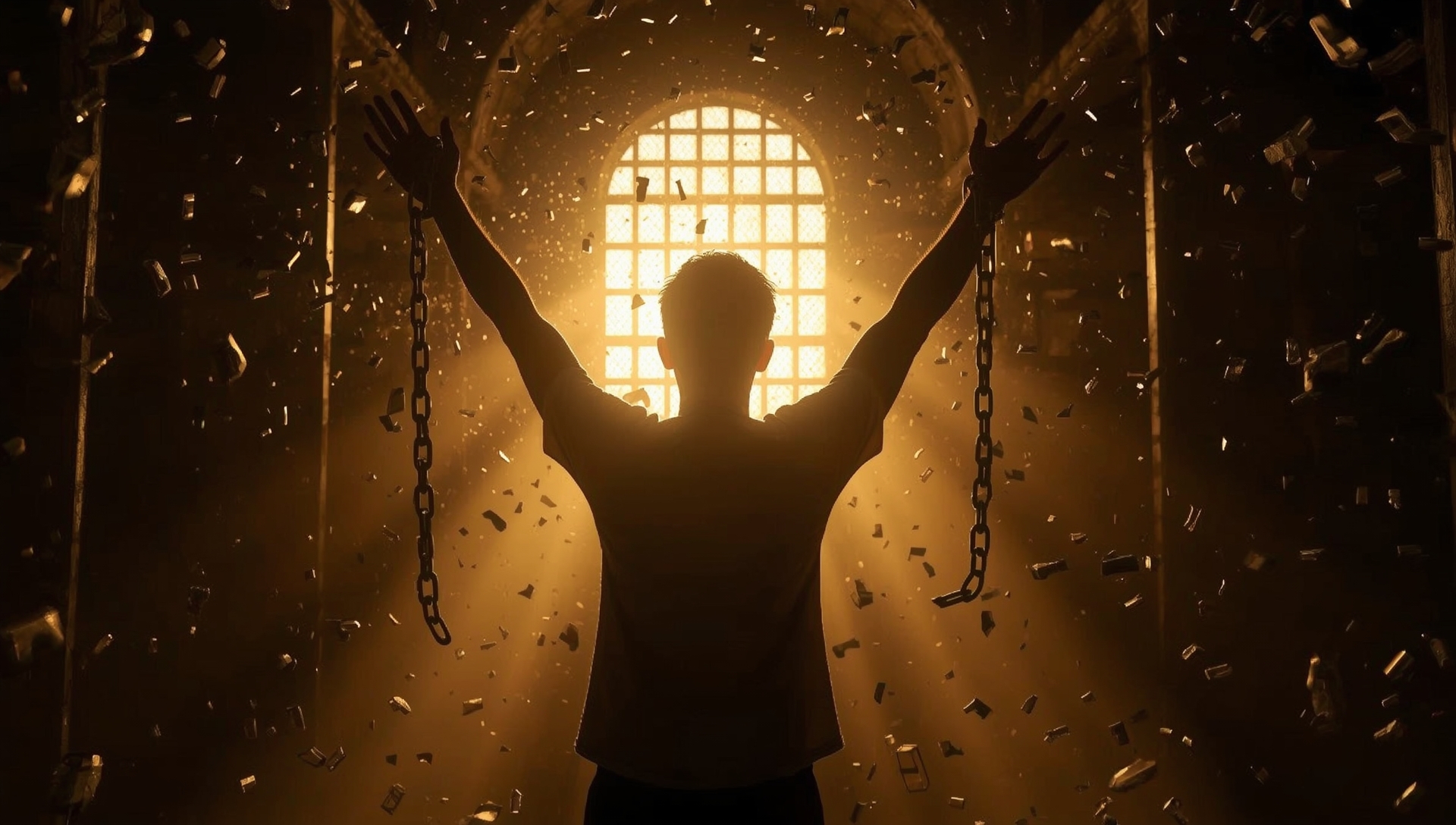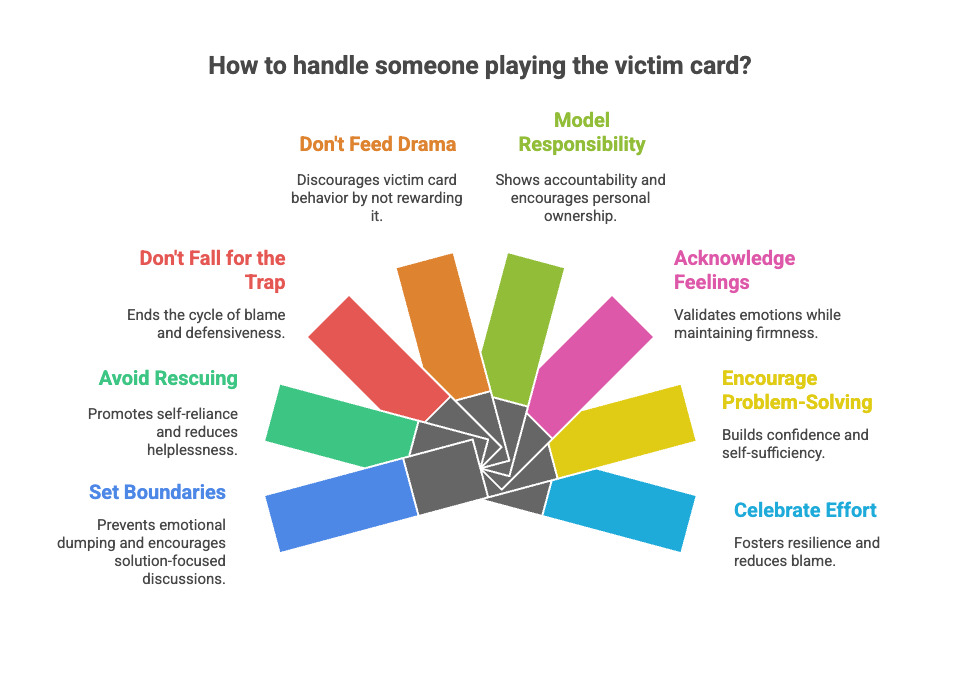
Amaha / / / The Hidden Psychology Behind Playing the Victim Card: Why We Do It and How to Break Free
ARTICLE | 6 MINS READ
The Hidden Psychology Behind Playing the Victim Card: Why We Do It and How to Break Free
Published on
12th Sep 2025

Serah Koshy
M.A, M.Phil

We've all encountered that colleague who constantly blames others, that friend who never takes responsibility, mothers and relatives who always complain about how unfair things have been to her or perhaps caught ourselves slipping into this pattern during tough times.
"The victim mentality is often a learned defence mechanism that becomes a prison of our own making," says Dr. Vani Kulhalli, a leading psychiatrist from Amaha, Mumbai. "It protects us from immediate emotional pain but robs us of our power to create genuine change."
But what does playing the victim card really mean, and why do people keep falling into this trap?
What Does Playing the Victim Card Actually Mean?
It's a psychological pattern where someone consistently sees themselves as the target of others' negative behaviour, regardless of the actual circumstances. When someone plays the victim card, they're essentially saying, "Nothing is my fault, and I have no control over my situation."
When someone is playing the victim card, they position themselves as the one being wronged, even in situations where the blame is not one-sided. It’s a way of shifting responsibility, gaining sympathy, or avoiding tough accountability.
This mindset goes beyond occasional self-pity. It becomes a lens through which everything gets filtered. Your boss gives you feedback? They're targeting you. Your relationship ends? Your partner was toxic. Traffic makes you late? The universe is against you.
We all have moments where life genuinely feels unfair. The difference lies in whether we stay stuck in that feeling or use it as fuel to move forward.

Learn how to Quit the Victim Mindset
Learn Ways to Manage and Handle the Victim Mindset
The Root Causes: Why Do People Play the Victim Card? Science behind Victim Mentality
Understanding the victim mentality requires looking at its origins. These are learned behaviours often starting in childhood.
Childhood Experiences and Family Dynamics:
Many Indians grow up in households where expressing emotions directly isn't always encouraged. Children learn that being seen as suffering or helpless gets them attention and care. A child who cries gets comforted, while one who stays strong might get overlooked.
Learned Helplessness:
Martin Seligman’s research in the 1970s showed that when people repeatedly face situations where they feel powerless, they eventually stop trying - even when escape is possible. This learned helplessness often becomes the soil where the victim mentality grows.
Cultural Conditioning and Social Learning:
Our society often rewards victimhood in subtle ways. The person who complains the loudest gets attention. The squeaky wheel gets the oil, as they say. Social media has amplified this further. Posting about struggles gets more engagement than celebrating successes.
Trauma and Protective Mechanisms:
Sometimes, the victim mentality develops as genuine protection. Someone who's experienced real trauma might find it safer to assume the worst about situations. Their brain learns to expect threats everywhere.
Cognitive Biases:
Our brain takes shortcuts that keep the victim card alive:
- Self-serving bias: Blame others for failures, but take credit for success.
- Confirmation bias: Remember every insult, forget the kindness.
- Attribution error: My failures are fate, yours are laziness.
To gain emotional support:
Playing the victim card offers several hidden benefits. It removes blame, justifies failures, garners sympathy, and provides an excuse for not trying. When everything is someone else's fault, you don't have to do the hard work of changing.
Attention and Sympathy:
Being a victim gets you attention. People rally around you, offer support, and treat you with kid gloves. It's intoxicating, especially if you grew up feeling ignored or dismissed.
Fear of Responsibility:
Taking responsibility is scary. It means acknowledging that you have the power to change things, which also means you can't blame others when things go wrong. For some people, that level of accountability feels overwhelming.
How to Spot Someone Playing the Victim Card: Signs Someone is Playing the Victim Card
1. Constant External Blame
They always have someone else to pin their problems on—the boss, the spouse, society, even fate. Nothing is ever their responsibility, which means they rarely learn from setbacks and keep repeating the same cycles.
2. Refusal to Accept Solutions or Accountability
Suggest a solution, and they’ll tell you instantly why it won’t work. They’re more invested in proving they’re powerless than in trying to change things. When asked about their role, defensiveness replaces self-reflection.
3. Attention-Seeking Behaviour
Every conversation becomes a monologue about their struggles. They highlight how their problems are worse than everyone else’s, often exaggerating hardships to draw sympathy and validation.
4. Passive Aggression
Direct confrontation means accepting responsibility, so they avoid it. Instead, you’ll notice silent treatment, subtle digs, or emotional manipulation: ways of keeping control while still appearing helpless. Passive aggressive behaviour at the workplace can make things unnecessarily complicated.
5. The Constant “Why Me” Attitude
They genuinely believe life has singled them out for misfortune. Over time, this mindset erodes their confidence and fuels a cycle of negativity, leaving them stuck in a self-made trap.
Breaking Free from Your Own Victim Mentality: How to Stop Playing the Victim Card
Recognising that you might be playing the victim card takes courage. But this awareness is the first step towards real change.
1. Start with Self-Awareness
Pay attention to your thoughts when things go wrong. Are you immediately looking for someone else to blame, or do you stop to ask what part you played? Catching yourself in the act is the foundation for change.
2. Challenge Your Internal Dialogue
Shift your language from defeat to learning. Replace “Why does this always happen to me?” with “What can I take away from this?” The way you talk to yourself directly influences whether you stay stuck in victimhood or move towards growth. Therapy can help you change the narrative in your head.
3. Take Small Steps and Focus on Control
Don’t wait for big breakthroughs, begin with small acts of responsibility. Admit you were late because you left late, not because traffic was impossible. Over time, these little acknowledgements rebuild your sense of control.
4. Build Resilience in Everyday Life
Physical activity, mindfulness practices, or even maintaining a journal can strengthen your mental stamina. These tools help you respond rather than react, giving you a stronger sense of agency in stressful moments.
5. Seek Support, Not Just Sympathy
There’s nothing weak about asking for help. Speaking to skilled therapists can guide you out of destructive loops, but it’s important to seek solutions and growth, not just validation. Real support pushes you forward instead of keeping you stuck.

Practical Strategies for Handling Someone Who Plays the Victim Card
Dealing with chronic victim card players requires patience and boundaries. You want to be supportive without encouraging their behaviour.
Set Clear Boundaries: Don't become their emotional dumping ground. You can say, "I care about you, but I'm not comfortable always discussing these same problems. Let's talk about solutions or something else."
Avoid Rescuing Them: Your natural instinct might be to fix their problems, but this actually reinforces their helplessness. Instead, ask questions that help them think of solutions themselves.
Don't Fall for the Trap: When they try to make you the villain, don't defend yourself endlessly. A simple "I see we have different perspectives" can end the cycle.
Don’t feed the drama: The less you reward victim card behaviour, the less it continues.
Model Personal Responsibility: Show them what taking ownership looks like by being accountable for your own mistakes and problems.
Acknowledge feelings but stay firm: “I understand you’re upset, but this is your responsibility.”
Encourage problem-solving: Ask: “So, what’s your plan to handle this?” Instead of immediately offering sympathy when your someone faces a problem, ask them what they think they could do about it. Build their confidence in their own ability to handle challenges.
Celebrate Effort Over Outcome: Focus on the process rather than results. This builds resilience and reduces the tendency to blame external factors for failures.
The Path Forward: Reclaiming Your Power
Breaking free from the victim mentality isn't about becoming heartless or never acknowledging genuine difficulties. It's about reclaiming your power to respond rather than just react. Playing the victim card isn’t about being weak. Sometimes it’s an unconscious shield against pain. But once you notice the pattern, you can choose differently.
And if you’re dealing with someone always stuck in that mindset, remember - you don’t need to rescue them. Support, yes. But responsibility, no. Because true freedom begins when you stop saying, “Life is against me” and start saying, “Life is with me.”
The moment you stop seeing yourself as a victim, you start seeing yourself as a survivor. And survivors don't just endure life; they shape it.
The Cultural Context: Victim Card Meaning in Hindi
हिंदी में इसे हम अक्सर “शिकायत की आदत” या “दूसरों को दोष देना” कहते हैं। यानी हर समस्या के लिए बाहर कारण ढूँढना और खुद की जिम्मेदारी से बचना। यह धारणा हर संस्कृति में मौजूद है, लेकिन भारतीय समाज में यह विशेष रूप से पारिवारिक रिश्तों और सामाजिक ढाँचों में दिखाई देती है।
हमारे यहाँ का संयुक्त परिवार प्रणाली कभी-कभी अनजाने में इस मानसिकता को बढ़ावा देती है। जब परिवार के कई लोग लगातार किसी एक की समस्याएँ सुलझाने में लगे रहते हैं, तो वह व्यक्ति धीरे-धीरे खुद समाधान ढूँढना नहीं सीख पाता। इस तरह victim card खेलना उसकी आदत बन सकती है।

Are there Things about Yourself that you Want to Improve?
Let's Find those issues about Your Life
Frequently Asked Questions
What are the main signs that someone is playing the victim card?
The key signs include constant external blame, refusing practical solutions, attention-seeking behaviour through problems, passive-aggressive communication, and an inability to see their role in recurring issues. They often compete with others' problems and dominate conversations with their struggles.
Can victim mentality be cured or overcome completely?
Yes, victim mentality can be overcome with consistent effort and self-awareness. It requires recognising the patterns, challenging negative thought processes, taking gradual responsibility for your responses, and focusing on what you can control rather than external circumstances.
Why do some people get stuck in a victim mentality while others don't?
Several factors contribute including childhood experiences, family dynamics, past trauma, cultural conditioning, and learned behaviours. Some people develop it as a protective mechanism that becomes habitual, while others learn early on to take responsibility and problem-solve independently.
How do I help someone who constantly plays the victim card without enabling them?
Set clear boundaries about emotional dumping, avoid rescuing them from every problem, don't engage in endless defending when they blame you, ask solution-focused questions instead of offering immediate sympathy, and model personal responsibility in your own behaviour.
What's the difference between genuine victimization and victim mentality?
Genuine victimisation involves real harm or injustice where the person is actually powerless in that moment. Victim mentality is a persistent pattern of seeing yourself as powerless and blaming others, even in situations where you have choices and control over your responses.
Was This Article Helpful?
Yes
No



Build a good life for yourself
with Amaha
Best App
for Good
on Google Play India

Amaha is equipped to provide care and support for individuals experiencing severe psychological distress, including complex psychiatric disorders and other complex conditions. For those in need of more intensive care and daily support, we are launching an in-patient care facility in Bengaluru soon.
If you or someone you know is experiencing at-risk behaviors or safety concerns, or any other life-threatening crisis or critical mental health situation, contact a helpline or go to the nearest hospital or emergency room. Having a close family member or friend with you for support can be invaluable during this time.
For emergency mental health support, please call the national Tele MANAS helpline at 1-800 891 4416.